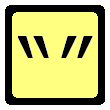 |
 |
PUNCTUATION |
|||||
|
|
|||||||
|
Speech marks
Speech marks are also referred to as QUOTATION MARKS and as INVERTED COMMAS. They are used around QUOTATIONS and TITLES and to indicate DIRECT SPEECH.
QUOTATIONS are easy to punctuate. Having identified the precise words that are found in the book, play or poem, etc., enclose them in speech marks.
Shakespeare said of Othello that "he loved not too wisely, but too well."
TITLES are similarly easy to punctuate. Speech marks are used to enclose the title of the book, play, newspaper, song, etc.
"I Wanna Hold Your Hand" sold 13 million copies worldwide. I was moved to tears by the final chapter of "Black Beauty".
Sometimes, for a variety of reasons, it may be necessary to identify a particular word within a sentence; for which speech marks can be used. (With the advent of word processing, this convention is gradually being superceded by writing such words in italics.)
Should I close the letter with "faithfully" or "sincerely"? I have seen "separate" spelt so many different ways.
When reporting DIRECT SPEECH, the speech marks are used to enclose the actual words that were spoken.
There are a number of patterns that may be adopted.
She said, "I will meet you tonight at eight." "I will meet you tonight at eight," she said. "I will meet you tonight," she said, "at eight."
The narrative part of the sentence (she said, he exclaimed, they shouted) is almost always separated from the direct speech by a comma. This is the case whether the narrative comes before, after, or in the middle of the direct speech.
If the direct speech concludes the sentence, it closes with a full stop; whereas, if there is some narrative to follow, the direct speech usually closes with a comma.
Tony shouted, "I am going home." "I am going home," shouted Tony.
However, where appropriate, the closing comma can be replaced with a question mark or an exclamation mark.
"Are you going home?" asked Tony. "Go home!" shouted Tony.
Where this is the case, you will note that a lower case letter is used for asked Tony and shouted Tony - even though the phrases follow a question mark and an exclamation mark (with their own built-in full stop.)
On occasion, the direct speech will consist of more than one sentence and you may wish to interject the narrative between sentences. The following example should make it clear how to punctuate such a paragraph.
"I don't often go out these days," she said. "In fact, I can't remember when I last went to a restaurant. I hope I don't show you up."
|
|||||||
|
Introduction - Capital letters - Full stops - Question Marks - Exclamation marks - Abbreviations - Contractions - Commas - Speech marks (Quotation marks - Inverted comas) - Possessive apostrophes - Colons - Semi-colons - Brackets - Hyphens - Dashes - Obliques (slashes)
|
|||||||
|
|
|||||||
